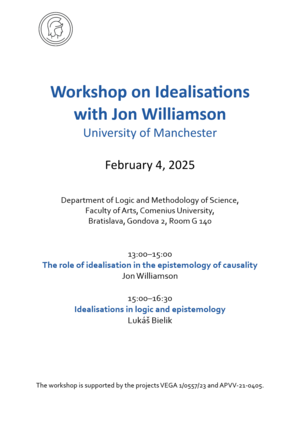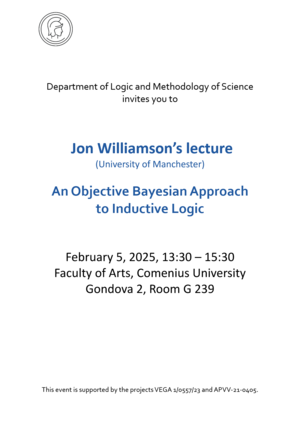Aktuality
Hodnoť.to
Milé študentky/milí študenti,
mnohým z vás prišiel pred pár dňami do mailovej schránky prieskum spokojnosti študentov Hodnoť.to 2025.
Preto vás chceme poprosiť, aby ste si skontrolovali svoj školský email a vyplnili dotazník. Vďaka vašim odpovediam môže naša škola získať cennú spätnú väzbu a pracovať na zlepšení kvality štúdia.
Dotazník je anonymný, zaberie len pár minút a môže ovplyvniť budúcnosť a financovanie vysokoškolského vzdelávania. Navyše každá/ý zapojená/ý študentka/študent má šancu byť zaradená/ý do súťaže o 1× iPhone 16, 3× iPad a 10× AirPods.
Ďakujeme za váš čas aj postrehy.

Podujatia KLMV vo februári
Katedra logiky a metodológie vied pozýva na dvojicu podujatí s prof. Jonom Williamsonom (https://jonwilliamson.uk/) z University of Manchester.
Workshop on Idealizations
Termín a miesto konania: 4. 2., 13:00 – 16:30, G140
Jon Williamson: The role of idealisation in the epistemology of causality
Abstract: In this talk, I shall describe three strategies for pursuing the epistemology of causality. One strategy is to make strong theoretical idealisations and offer methods that guarantee success in cases where those idealisations hold. For example, Donald Rubin's potential outcomes framework and Judea Pearl's graphical causal modelling framework have both led to very fruitful streams of theoretical results. A second strategy is to make strong metaphysical assumptions and idealisations to motivate theories of causal enquiry. For example, probabilistic theories of causality can be used to motivate certain statistical approaches to causal inference, while agency or interventionist theories of causality steer one towards specific kinds of causal models, and dispositional or mechanistic theories are sometimes used to motivate methods such as process tracing. A third strategy is to try to avoid strong assumptions and idealisations in the hope of developing accounts of causal enquiry that are more general and less controversial, but nevertheless informative. The evidence-based evaluation movement can be thought of as situated in this camp, as can Evidential Pluralism, a recent theory of causal enquiry. I shall argue that substantial progress can be made by pursuing the third strategy.
Lukáš Bielik: Idealisations in Logic and Epistemology
Abstract: Idealisations and idealised assumptions are part of scientific models. When evaluating competing scientific models in relation to a target system, the standard consideration is to consider the question of how well the model provides accurate predictions or how well it can explain the phenomena of the target system (Weisberg 2013; Frigg and Hartmann 2024). These models contain so-called descriptive idealisations. On the other hand, normative disciplines such as logic, decision theory, or (formal) epistemology come with normative models of how we should reason, make decisions, or change our beliefs respectively. Part of normative models are so-called normative idealisations (Colyvan 2013). The aim of my paper is to show in what sense normative idealisations differ from descriptive idealisations, what is the relationship between a target system and a normative model, and how one can think about the preference of one normative model over another, competing model. Using examples of both normative and descriptive idealisations from both logic and formal epistemology, I show that the preference of one normative model over another is a matter of instrumental justification.
Pozvaná prednáška: An Objective Bayesian Approach to Inductive Logic
Termín a miesto konania: 5. 2., 13:30 – 15:30, G239
Jon Williamson: An objective Bayesian approach to inductive logic
Abstract: The objective Bayesian approach to inductive logic appeals to Edwin Jaynes' principle of maximum entropy, which holds that one should use the probability distribution with maximum entropy, from all those that fit the evidence, to draw inferences, because that is the distribution that is maximally non-committal with respect to propositions that are underdetermined by the evidence. This talk provides an introduction to the logic and its motivation, explaining how it overcomes some problems with Carnap's approach to inductive logic and with the subjective Bayesian approach. It also describes a range of recent results that shed light on features of the logic, its robustness and its decidability, as well as methods for performing inference in the logic.
Pavel Cmorej (1937 – 2025)
Dňa 16. januára 2025 nás zastihla smutná správa, že našu komunitu vo veku 88 rokov opustil doyen slovenskej logiky, vedec, pedagóg a spoluzakladateľ katedry logiky a metodológie vied, prof. PhDr. Pavel Cmorej, CSc.
Profesor Cmorej sa nezmazateľným spôsobom zaslúžil o rozvoj a propagáciu logiky, logickej sémantiky, filozofie logiky, analytickej filozofie a filozofie jazyka na Slovensku i v Českej republike. Okrem viacerých monografií (Na pomedzí logiky a filozofie – 2001, Úvod do logickej syntaxe a sémantiky – 2001, Analytické filozofické skúmania – 2009) a viac ako stovky vedeckých a odborných štúdií sa zaslúžil o vznik a rozvoj medzinárodne uznávaného časopisu pre analytickú filozofiu – Organonu F, ktorý kultivoval analytické filozofické myslenie presahujúce naše hranice. Vďaka jeho práci a vedeniu odrástli viacerí súčasní predstavitelia logiky a analytickej filozofie na Slovensku, vrátane niektorých členov našej katedry.
Pavel Materna (1930 – 2024)
Dňa 25.10.2024 komunitu priateľov logiky a analytickej filozofie opustil prof. PhDr. Pavel Materna, CSc. Nezmazatelne sa "podpísal" na rozvoji a propagácii Transparentnej intenzionálnej logiky Pavla Tichého a v tomto rámci vybudoval aj hyperintenzionálnu teóriu pojmov. Rodine a najbližším vyjadrujeme úprimnú sústrasť.
Aktuálny rozvrh
Pozrite si rozvrh všetkých členov KLMV v ZS 2024/2025.
Dva workshopy s Timothym Williamsonom
Katedra logiky a metodológie vied v rámci riešenia projektov APVV-21-0405 a VEGA 1/0557/23 organizuje dva workshopy so vzácnym hosťom, Timothym Williamsonom (New College, Oxfordská univerzita):
- utorok 1. októbra 2024, 10:00 – 12:00 a 14:00 – 16:00, miestnosť G140, workshop o metodológii filozofie pre všeobecné publikum (výskumníci, študenti, odborná verejnosť)
- pondelok 30. septembra 2024, 10:00 – 12:00 a 14:00 – 16:00, miestnosť G140, workshop o kondicionáloch
Viac informácií nájdete v priložených plagátoch.
Staršie udalosti
Transparent Intensional Logic and Counterfactuals
Katedra logiky a metodológie vied pozýva na workshop "Transparentná intenzionálna logiky a kontrafaktuály" ("TIL and Counterfactuals"), ktorý sa uskutoční v utorok 12. 3. od 16:00 v miestnosti G140.
Abstrakty vystúpení
Reasoning from the Absurd: Initial Steps Toward a Sketch of an Outline
Marie Duží & Bjørn Jespersen
This talk presents the first steps toward developing a TIL theory of counterpossibles, counterfactuals with an impossible antecedent. We suggest that this theory needs to be hyperintensional. We begin by summarizing the standard TIL analysis of intensional counterfactuals. The analysis centres around a procedure producing a proposition (truth-condition) that takes the value True if the antecedent implies a consequent in all the possible worlds that differ from the actual one, except that the antecedent is true. However, this conception yields vacuism (vacuous truth) in the case of an impossible antecedent. The most common nonvacuist solution revolves around impossible worlds, points of evaluation at which the impossible antecedent can be true. However, we are not going to adopt impossible worlds. Instead, we wish to develop a structuralist alternative to our circumstantialist rival. Our working hypothesis is this. If there is a link of conceptual relevance between the impossible antecedent and the consequent, then the so produced proposition is true, provided the consequent is true, otherwise false. This work is a further contribution to the ongoing TIL-based inquiry into various notions of impossibility. The most recent results can be found in the paper 'Impossibilities without impossibilia', forthcoming in Inquiry.
What Could a (Hyperintensional) Theory of Counterfactuals Take into Account?
Lukáš Bielik
In my talk, I focus on several issues that have emerged in discussions on the semantics of counterfactuals since the mid-twentieth century. Since Transparent Intensional Logic (TIL) is a logico-semantic system with significant expressive power, it is of interest to explore how TIL can contribute to solving several traditional problems in the semantics of counterfactuals. Some of the problems and solutions have already been outlined by P. Tichý in (1978) and (1984), others are still under discussion. The presentation gives prominence to some theoretical desiderata that hyperintensional semantics could take into account in building a systematic theory of counterfactuals.
ŠVOK 2024
Študentská vedecká a odborná konferencia Katedry filozofie a dejín filozofie a Katedry logiky a metodológie vied sa uskutoční 19. 4. 2023 o 9:00 v miestnosti Š520.
Prihlásiť sa možno do 20. 3. 2023, termín odovzdania prihlásených prác je 7. 4. 2023.
Prihlášky zasielajte e-mailom Mgr. Daliborovi Makovníkovi (KLMV).
Výročná konferencia KLMV (1962 – 2022)
V dňoch 29. 6. – 1. 7. 2022 sa uskutoční Výročná konferencia KLMV pri príležitosti šesťdesiateho výročia počiatkov našej katedry.
Konferencia sa koná v Kongresovom centre Academia (Stará Lesná). Pozvanie na konferenciu prijali hostia z príbuzných pracovísk v Českej republike aj na Slovensku, zástupcovia viacerých katedier FiF UK, dekan FiF UK, ako aj rektor Univerzity Komenského v Bratislave, prof. JUDr. Marek Števček, PhD.
Pozrite si program konferencie a elektronickú knihu abstraktov.
Novým vedúcim katedry sa stal doc. Lukáš Bielik
Od 1. októbra 2020 sa funkcie vedúceho Katedry logiky a metodológie vied ujal doc. Mgr. Lukáš Bielik, PhD.









